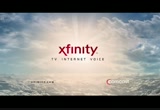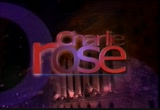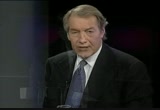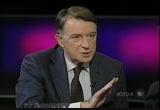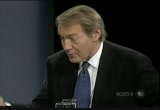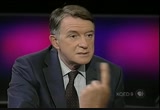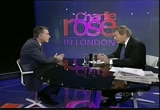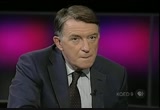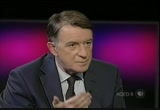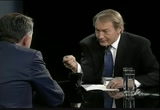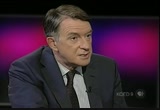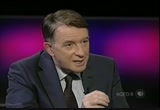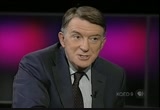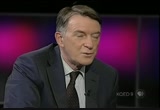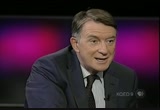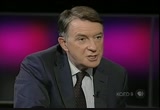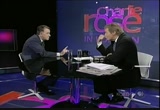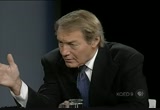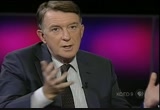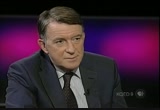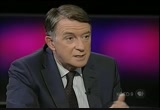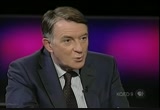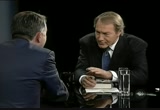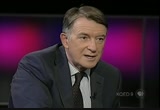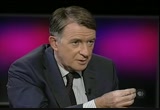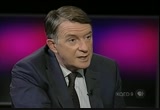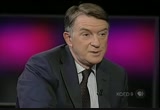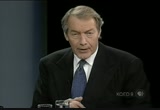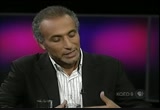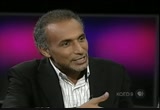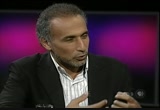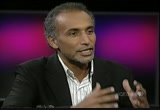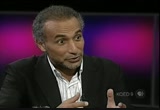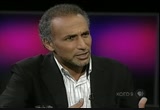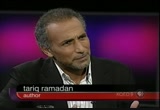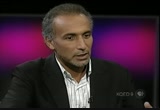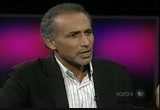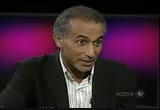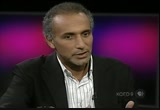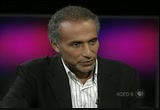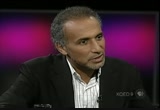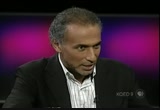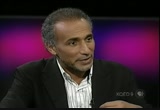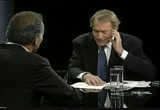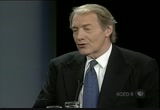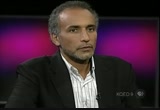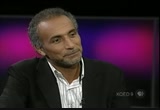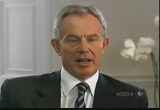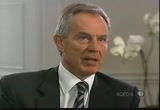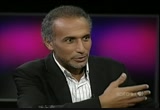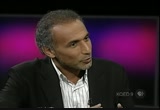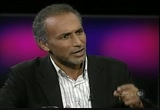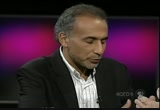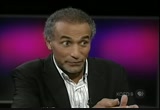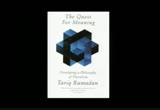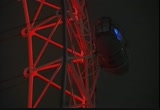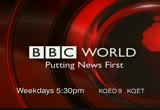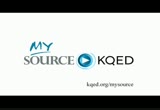tv Charlie Rose PBS September 9, 2010 11:00pm-12:00am PST
12:00 am
you >> charlie: welcome to our program, from london, tonight, peter mandelson a key player in british politics and in the labor party talks about his new book, called "the third man." >> gordon needed to recognize that what the public were fearing, and that was a mounting crisis in our public finances, he needed to address that and explain to people what would be the solution to those problems just as he had been so good at explaining both the solutions to our banking crisis and the actions that we needed to take as a government to combat the recession, and he just did not get that right. >> charlie: we continue with a conversation with islamic scholar from oxford university, tariq ramadan. >> we should, muslims, come back to the fundamentals and be
12:01 am
critical -- this critical engagement of muslims, the critical mind, this is something i have always been talking about it the last 25 years. we need muslims with deep faith and critical minds to be able to look at our own failures from within and to build and not to be the victims, not to play the victim mentality, not to be the object of history but to be the subject of our own history. >> charlie: mandelson, and ramadan, from london, when we continue. funding for "charlie rose" was provided by the following. >> over a century ago, gottlieb daimler wrote four words that were a promise to himself and to the world. a promise to invent the first automobile, and to keep reinventing. to build the type of cars that define true performance while never sacrificing their true beauty. and to introduce innovations that help save lives and the planet. four simple words mercedes benz lives by to this day. the best, or nothing. that is what drives us.
12:02 am
>> additional funding provided by these funders. >> and by bloomberg. a provider of multimedia news and information services worldwide. ♪ captioning sponsored by rose communications >> from london, a special edition of "charlie rose." >> charlie: lord peter mandelson is here. he's a member of britain's how was lords, former cabinet minister under prime ministers tony blair and gordon brown, a key architect of the labour campaign that helped his party rise to power in 1997. he served as secretary of state for trade and industry, secretary of state for northern ireland and secretary of state for business. he has now written a book about those years of public service. it is called "the third man, life at the heart of new labour," i am pleased to have peter mandelson back on this program. welcome. >> nice to be back. >> charlie: let me get to some
12:03 am
of the controversy first. that tony blair is not happy that your book is coming out as it did, because -- and that somehow it's created a little tension between the two of you. >> no tension between the two of us. tension between our respective publishers. >> charlie: did you -- >> it would make a great deal more than a book to come between me and tony blair. >> charlie: i'll come to that later. were you intent on getting out first? >> i was intent on getting my book into the book shops as soon as i could mainly because, while it's fresh in my memory, i wanted to get it on to paper, into print, but also because i want to move on in my life. i did not want to wait for another year before i published a mixture of memoir, autobiography and history. >> charlie: it's also based on notes you took. >> of course. >> charlie: you intended always to write a book so you kept -- >> no, i'm an inveterate notetaker regardless of books or
12:04 am
diaries, i never kept a serial diary day in and day out but from the start of the 1980's when i started off as a very young man in politics i was taking notes of meetings, what we needed to do and what was agreed and to remind myself what i needed to do next so i'm a diligent note-taker rather than a serial diary take keeper. >> charlie: gordon brown, tony blair, peter mandelson were the people who did what? >> were the people who in the 1980's who came together as almost brothers, three musketeers and decided that after the near-death experience of the labour party in the 1980's, if we were not only going to rescue ourselves from oblivion but also remake ourselves and flourish, we really had to reform and modernize our party, and what we did, the three of us, not alone, there were others who did with
12:05 am
us was to bring about what was a transformation of labour, of the center-left in britain under tony blair's leadership in the 1990's and it won us three successive election victories. >> charlie: why do you think gordon brown lost? >> he lost, this year, for three reasons. one, we had been in office for 13 years and many people thought they have had their innings, it's someone else's turn. secondly, because we were hit by a huge banking, financial and economic crisis -- >> charlie: but he got some credit for the way he handled that. >> quite rightly, which i'm happy dom back to, but also thirdly as i say in my book, we rather lost our way as a government. we had had a very strong definition of new labour, new labour policies, new labour outlook, new labour connection with mainstream center-ground voters in this country and i think that many of those voters felt they had sort of lost their compass a bit, they had gone off
12:06 am
piece and the result is that many didn't vote or they voted for the next new fresh alternative and that appeared to be the conservatives. >> charlie: what do you think of david cameron? >> i think he's a good politician. i'm not sure how good his policies are going to be, but that's a different question. >> charlie: he just lost his father -- >> he lost his father, yes, and he is a very strong family man -- look, he's a regular sort of nice guy, and he does his politics well. he communicates wellment he leads his party well. >> charlie: does he remind you of tony blair? >> he does, slightly, yes, but with different policies, and i think that -- look, this is a government that's not even out of its honeymoon period, that it's now shaping up to take some major decisions about public spending. they are signaling, now, that they are going to -- not close down vast reaches of government but certainly have government retreat -- cut spending, on education and health and police and transport and universities
12:07 am
and science and skills. all these areas of public provision, of government activity are going to be very savagely cut. now, that will present them with a very, very severe test and we'll see that during the course of the next few months. >> charlie: tony blair said to me in a program that aired this week, an interview that i did on tuesday, that he agreed with what the austerity measures and believed they were necessary. >> i don't -- >> charlie: does peter mandelson agree with the austerity measures and believe they were necessary? >> i have agreed with government and written about this in my book that we should have been clearer, as a government, that austerity was on its way. what i don't agree with is either the scale of what the government -- the present government seemed to be shaping up to do, but also the speed. i think that we need to consolidate our economic recovery and our growth rather more stngly before we start taking a whole swath of public
12:08 am
spending and investment out of the economy. >> charlie: their argument is that gordon brown spent like there was no tomorrow. >> not true. not fair. >> charlie: and that -- that unlike tony blair, he was committed not to new labour but to a different labour. >> look, if you were to try and really peel away the differences between tony blair and gordon brown -- >> charlie: which you do here. >> which i do. you will see in gordon brown somebody who favors bigger state, greater government activity, higher public spending and investment than perhaps tony blair does, but what tony blair also presided over as prime minister was a huge reinvestment in our public services, but what he also stood for was reforming the state. reforming government. reforming -- creating a new model of delivery of those public services and there again was a difference of emphasis between him and gordon down. >> charlie: i see. difference in terms of public-private? >> difference in terms of
12:09 am
public-private. difference in emphasis both on the role of the government, scale of government activity and spending and investment, particularly in the face of the sort of fiscal crisis that we face. yes. differences in policy, therefore, between blair and brown. >> charlie: blair says gordon brown had an emotional intelligence of zero. >> again, i think a little harsh. a little harsh. >> charlie: what would you say? >> what i would say is what's the difference -- >> charlie: what's the difference in personality and temperament of these two men? >> i'll tell you what it is. tony blair had, and has, a wonderful, intuitive grasp as a prime minister. he doesn't need a compass. he just follows his nose. he has a wonderful political instinct. gordon brown, less so. tony blair -- >> charlie: you are -- less so -- >> no, because it's not black and white and extreme in the way that -- >> charlie: it was for tony blair. he says he does not have an emotional intelligence. >> i know, but i'm giving you my view, and i think that's a
12:10 am
little harsh. tony blair was relaxed with an audience of three or an audience of 3,000, whether he was on the television or not, gordon brown less relaxed. when it came to the economic crisis, however -- and you touched on this before, charlie -- i think gordon brown grasped the big picture, the scale, the issues that were confronting not just our country but the whole of the western banking system, and i think in most respects he got his response to the banking crisis right. i think he got his economics right. i think he got his politics less right in the way in which -- >> charlie: he was not a natural politician? >> no. because he wasn't as good a communicator but more so, he didn't get on to the wavelength in my view -- and i had this discussion -- i recounted it in the book, so many times -- if you're going to accelerate out of the storm as we did when the economic crisis hit us, you're going to burn up petrol and fuel
12:11 am
and accelerate to keep the going going and the public want to know when you're going to be slowing down, when the burning up of that fuel and debt is going to start falling away. what gordon brown didn't understand was that whilst people supported his accelerating out of that storm, they wanted to know how he was going to slow down, how he was going to repair the public finances and he didn't see quickly enough or strongly enough the need to explain to the public quite how we were going to tackle the aftermath of this economic crisis so in a sense he won the war but he was in danger, and almost did, lose the peace. >> charlie: i must confess to you i'm always a little wary when someone says, "our problem is that we weren't good communicators." generally, it's not a question of communication, it's a question of content. >> look, he should -- >> charlie: do you agree with that? >> up to a point, i would, yes.
12:12 am
but look. gordon needed to recognize that what the public were fearing, and that was a mounting crisis in our public finances. he needed to address that and explain to people what would be the solution to that -- those problems just as he had been so good at explaining both the solutions toure on banking crisis and the actions that we needed to take as a government to combat the recession and he just did not get that right. the public saw through it. >> charlie: the impression i have from blair's book and from mandelsob's book, behind the scenes -- mandelson's book, blair and brown were at each other's throat. there was a lot more tension, in-fighting than anybody ever imagined. you have page after page after page after page of -- >> didn't tony blair say in his recent memoirs that things got a little difficult especially toward the end
12:13 am
>> charlie: you were there. >> i was there and i was painfully squeezed between them. >> charlie: blair prevailed and they got -- brown prevailed -- brown prevailed and he got blair out of there. >> he did. >> charlie: right. >> he did. he did prevail. >> charlie: where were you when that happened? >> i was in the european trade commission. i was on blair's side. >> charlie: you were. you were always fighting the effort by brown to overthrow blair. >> i was, and it didn't win me any friends in the gordon brown camp. >> charlie: but yet you came back to try to help him. >> when the crisis struck, when the crisis struck in 2008, he asked me to come back from brussels to rejoin the government and i did, and i came back as business secretary, and first secretary of state, effectively his deputy, which makes the story such a wonderful human as well as political tale. >> charlie: tell me about it. >> what happened was that --
12:14 am
from the beginning of 2008, i rather surprisingly started getting calls from gordon brown asking my views. asking me for advice. progressively, he started opening up to me and he started saying "i need your help" and that presented me with a huge dilemma, because there is a guy who had sort of run me down for years past because he identified me, quite rightly, with blair in the blair camp. i had, by this time, gone to brussels and was very happily working very hard as europe's trade commissioner. i actually didn't want to come back to britain, but when the crisis was there and he needed my help, i wanted to support both the government and my party. >> charlie: you actually fell in love with trade policy, didn't you? >> i did, strangely enough -- i know it would be amazing to your viewers. >> charlie: yes, it is. i have heard you speak about it
12:15 am
passionately. >> it's about economic growth, it's about jobs, it's about living standards not only in our own country but around the world. >> charlie: a tension between major powers in the world. >> it is. since i'm talking to you and an american audience, i would say this. >> charlie: worldwide audience. >> and a worldwide audience, i would say that the international trade system and community needs a bit more leadership. >> charlie: really. >> we need america to lead the world back into the negotiations for the world trade around the doha round -- >> charlie: you don't give president obama high marks in terms of what he's done on trade, do you? >> not on trade, no. many other things, yes, but not on trade. not yet. perhaps it's a priority for his second term. >> charlie: personality, a bit more. tony blair says, in his book, that leadership is about, in some cases, big balls. >> yes. >> charlie: and he identifies people with big balls as rupert murdoch.
12:16 am
>> yes. >> charlie: and alistair campbell. my question is where was peter mandelson when he was making these observations? >> he's very generous to me and i'm grateful to him. >> charlie: is there enough -- is there enough credit to peter mandelson in tony blair's book? >> read it. >> charlie: i've read it. >> plenty enough credit to go around. he describes me as, what -- a mere genius or something, the guy who could tell you today what was going to happen tomorrow and all this stuff -- but look. big balls is one thing, but also good judgment. >> charlie: tony blair and the war. >> yeah. >> charlie: what did it do to him? >> well, it -- i mean, it's made him unpopular. >> charlie: beyond unpopular. >> in this country, amongst a large swath of the population, yes, beyond unpopular. but for this reason. not because people doubted his sort of courage or his sort of sense of conviction, but many people believe that he took us
12:17 am
to war on a false premise. that the whole justification was weapons of mass destruction and there weren't any. whether there were or whether they weren't or whether they were camouflaged or whether they were shoved over the border into syria just in the nick of time, who knows. what people know, though, is that once we had gone into iraq, no weapons of mass destruction were discovered and people felt cheated. they felt that -- >> charlie: do they believe that -- that what, he betrayed them? >> no. they feel that for reasons other than weapons of mass destruction, he took us to war -- either in their view because he wanted to replace the government, the regime, and topple saddam hussein -- and by the way, who wouldn't want to topple saddam hussein, but whether that's justification to invade a country is a wider question -- or, or, because he was, as they would put it, led by the nose by your george bush -- that he was so sort of enthralled to the --
12:18 am
>> charlie: the poodle, is the word they use. >> the poodle -- that he didn't sort of step back and take a detached enough judgment about the rights and wrongs of going into iraq. >> charlie: my impression of him is that one -- looking at the chicago speech, and looking at his response to 9/11 -- even though 9/11 had nothing to do with iraq and saddam hussein -- but after 9/11, he was on board. >> he was. for this reason. >> charlie: if there were weapons of mass destruction or not, he was on board -- >> i'll tell you why. i'll tell you why. he thought the whole calculus of risk in the international system had changed with 9/11. that you were seeing a possible convergence of terrorist organizations, extremists who are prepared to go to any lengths to make their point, which, if put together with weapons of mass destruction in a sort of bazaar or supermarket that seemed to be emerging in
12:19 am
iraq, then the world -- literally, the world could be held to ransom by these people, and his view was zero tolerance -- sort of -- almost zero risk. we go in when we taste or smell -- have the least suspicion of what is going on. you can argue -- you can argue about that but let me just make this point to people. "you see, it was all exaggerated and it was all" whatever, those people who criticize and condemn tony blair have also got to ask themselves what they would be prepared to fight for in any circumstance. of course, war is ugly, and nobody wants to go to war. nobody wants to sacrifice human life in any war unless it's absolutely necessary, and what i say to the people who criticize tony blair is you have an obligation to say more clearly what cause, what reason, what justification, you would go to war for, at which point they usually fall completely silent. >> charlie: where were you when
12:20 am
he was making up his mind? >> i was in the house of commons but not in the government. >> charlie: yeah, but you were one of the three founders of new labour. were you telling him -- what? >> i was not telling him to storm ahead, but then he wasn't asking me, at that stage, for my opinion, and -- look, the book records i asked him on a number of occasions -- >> charlie: that's why i'm asking these questions. >> i asked him on a number of occasions, i said, "look, have you borne in mind and considered the consequences for this amongst moslem people around the world?" i remember in 2002 coming back from a speaking tour of islamic countries in asia, and my word, did they make an impression on me, and i said to him, "fine, you may have good reason or you think you have justification, but this could have huge ramifications. the way in which the west --" >> charlie: he understood that? >> i don't think he attached as much weight to it as he might have done. i also remember -- it's three
12:21 am
months, on saying to him, "have you got a plan for the day after following this invasion -- do you know wayou're going to do with iraq once you have toppled saddam hussein?" his view was -- >> charlie: what did he say when you said that? >> "that's for the united states to figure out." >> charlie: "that's for the united states" and i have invested british men and women in this and it's up to the u.s. to figure out what to do after? what does that say to you? >> it says he should have attached more weight, more weight, not only to the way in which moslem people would be looking at the west in the light of this invasion but he also should have been attaching more weight and voicing greater concern to president bush and his administration about the plans that were being drawn up in the state department for how to govern iraq after the invasion but as we know, were swept off the table by the defense secretary rumsfeld. >> charlie: with the limited history we have now, with
12:22 am
american troops in part leaving, was it a mistake for tony blair to lead britain into war? >> that is a very, very difficult question to ask one of his closest friends and allies. >> charlie: why? >> i'll tell you why. >> charlie: you make a big point here of saying i'm going to tell you the unvarnished truth. >> i'll tell you why. i don't want to cast doubt or aspersions to his motive. >> charlie: we're talking about not motive but mistake, peter, that's not hard. >> but hindsight is a difficult thing. >> charlie: was it a mistake with hindsight? >> if it had all gone according to plan people would be cheering him -- >> charlie: it didn't go according to plan. >> he should have made sure a proper plan was in place and the fact that the plan was not in place, the fact that very poor decisions were made immediately following the invasion were huge mistakes. >> charlie: he understands that now? >> yes, he does. but not that the original decision is something that he
12:23 am
would now retreat from. he doesn't say that. >> charlie: what do you think of alistair campbell? >> he's a very old friend. i would share tony blair's view of alistair campbell. some people can act in almost mad and insane ways but from the best possible motives and in the final analysis ending up on the side of right rather than wrong but they can, in the process, make misjudgments, both about situations and about other people and i think that was a danger that alistair flirted with. >> charlie: the austerity measures. what does david cameron have to do? what does george osborne have to do in order to bring the country to where they want them to do to
12:24 am
accept these very, very tough -- >> in my view, they have to do two thijs. make the case for paring back and -- two things. make the case for paring back and cutting back the branches of cutting spending without cutting the roots of future economic growth in this country. therefore, focus on your priorities, don't just take sort of an ax across the whole waterfront of public spending and investment. make sure that aus make your savings, cut down your ex-- that as you make your savings, cut down your expenditure, do not ax those things on which our future economic growth xendz depends. >> charlie: like research and development -- >> secondly, don't do so at the rate of not throwing away that you jeopardize what is still a fragile economic recovery under way in our country. so yes, set out your prospectus, set out your plans. we, after all, leaving government said we were going to
12:25 am
turn around over a period of four years 18 billion pounds worth of public spending. we were going to half our deficit in four years. that, i think, is the right scale at the right speed. they want to do more, much more quickly and much more indiscriminately, and the casualty of that in my view will not only be a lot of people's schools, their hospitals and other public services they rely on but also our future economic growth, and therefore, what they do now could have major adverse consequences for the future both of our economy and our society. >> charlie: millliband vs. millliband. who is best for the labour party? >> i have said i'm not going to pronounce between them but i don't think it will be any secret. >> charlie: the favorite millliband is your man -- >> if you're looking for somebody with strong conviction,
12:26 am
good judgment, decision-making ability, then i think that for most people that would leave you to david rather than his brother. >> charlie: is this kind of a choice between new labour and old labour? >> no, not as simple as that -- not quite as simple as that but i know his brother, ed, very well. i like him, i wish him well and i don't want him to be hurt as a result. >> charlie: how long will it take tony blair, do you think, to get his reputation back? >> that's very difficult, because he's been away from this country for all intents and purposes for three years. people haven't heard his voice. >> charlie: so it's important that he come and write his memoir? >> but then not just clear off and not be seen again -- he has a case to make both for his record and what he believes and how he led our country and changed our policy. if he doesn't make that case, he can't be surprised if people fall out of love with it, and him. >> charlie: this book is called "the third man, life at the heart of labour," peter
12:27 am
mandelson was there with tony blair and gordon brown and gives you an inside story of what it was like. back in a moment. stay with us. ♪ >> charlie: tariq ramadan is here. he is professor of contemporary islamic studies at st. anthony's college at oxford university. he is considered to be one of europe's most prominent scholars on islam. "the washington post" called him a muslim martin luther born in in switzerland to egyptian parents, he was banned from traveling to the united states under provision of the patriot act. that ban was lifted earlier this year. he has written more than 20 books about islam and its aggression. his new book is called -- he has written more than 20 books about islam and its integration. at a time when islam is being hotly debated, i am pleased to have tariq ramadan with me in
12:28 am
london. welcome. >> thank you. >> charlie: this idea of the burning at a church of the koran has what implications? because david petraeus has spoken out forcefully against it. >> i think -- i think he is right. when you know the islamic world and what is going in the islamic majority countries today and this perception that anything which is coming from the west, and especially from the states could be perceived as a provocation, and in fact it is a provocation, and the -- promoting this from his church in florida is just trying to target islam and muslims and he did it before with a book, so i would say that western muslims are not going to react to this. i think that they saw in the recent past that they are -- they know what freedom of expression means and they know also the meaning of provocation, but this could be
12:29 am
instrumentallized in islam countries by groups and population saying, "look, now it's too much, you did it with" -- >> charlie: you don't know who is doing it, you just know it's happening. >> exactly, which is exactly what could be done and it could be instrumentallized by muslims and saying this is -- and even by governments because we had governments directing the attention of the people toward the west when they are not, you know, promoting democracy and democratization with it, it's very easy to push this emotional trend against the west, and the impact of this could be just a catastrophe. >> charlie: what about building this -- some people think it's a mosque -- cultural center near the site of 9/11? >> i think -- you know, first, as a question of right, this should be allowed because this is the right of any citizen in this community center which is not the ground-zero mosque as it was said, it's just a community center near the place.
12:30 am
now, i also think that the muslims, when they deal with such issues, they have to take into account the sensitivity of the society, so it might be a bad, good idea -- now, it's a question of right and it's a question of living together in the future, not only in a peaceful way but to live together and to promote better understanding. i know that the people who are behind the community center and i know the people who are trying to promote its presence there, and i think it's -- it's good. they will do a good job. but they also have to take into account this -- so i think it's also a balance between your rights and the collective sensitivity, the collective psychology and not to let any party -- any political trend, any publicist or any christian fundamentalist group use this to nurture fear within the society. >> charlie: how do do you this? >> this is where you have to communicate. you have to be part of the society. i think that the american muslims should now be quite
12:31 am
clear that they are not involved in the american life, only when it comes to islamic issues. they are citizens. they should be involved in everything which has to do with the future of this society, and to build bridges with people at the grassroots level. i was calling in the book what i believe. i say the future is national movements of local initiatives where you work together and look at what happened in new york. you had jewish representatives. christian representatives. coming and saying, "it should be respected. we have to work together." so with this leadership, we can do something, and this is where we have to change the understanding of the people to know more about islam. i am invited to so many lectures and conferences. 95% of what i have to say is always to explain what islam is not. it's not violent. it's not this. it's not that. but to speak about the meaning of my life, the values, how much we have in common with christianity and judaism -- this is what we have to talk about,
12:32 am
and not only about the problems. >> charlie: tell me what islam is and what islam is not. >> what islam is is first religion which is the fundamental principle to believe in one good and the oneness of god is important religion and spirituality means that it gives to your life meaning. to god you belong and to god you will go back. so between belonging to him and going back to him, what you have to do is to try to get peace. islam is all about salaam. salam is the arabic work for peace. to get that inner peace is a jihad. jihad is the exact opposite of what i'm saying. it's not the way toward war, it's the way toward peace. to master, to control your inner tensions between the bad and the good temptation that you have within yourself and attraction towards the good to get that peace.
12:33 am
this is islam. i talk about islam in such a way. you can find so many similarities with christianity and scombrudism. >> with christianity and judaism. what islam is not is to impose itself onto the other. there is no constraint -- you can't have compulsion in matter of religion. we say in arabic coming from the koran, you cannot impose this, you have to respect the freedom, you have to respect the diversity of religion and there is something which is quite important. there is an implied ethic, implied islamic ethic which has to do with respecting, for example, the life of the innocent, so ethices of war in islam is completely opposed to what we had in the states in new york or what we have in london in the streets by killing innocent people -- not only is this not islamic, it's antiislamic, it's against my faith, the second victims of people killed are the muslims themselves so i would say this is what islam is and has nothing to do with the violence.
12:34 am
>> charlie: what responsibility -- and i ask this carefully -- does islam have for allowing the perception to be? >> yes, i think it's a good question and this is something which the starting point of our accountability as muslims. you may say islam is not this and it is not that, at the end of the day the muslims had speak out, they should speak out about -- >> charlie: and in condemnation of any acts that are taken in the name of the religion -- >> exactly. >> charlie: when the religion, by its own definition, would be against that violent act. >> exactly. i think this is their obligation and their duty. this is a moral duty to speak out and say this is not islamic, this is against islam and islam is a great religion but muslims are not acting in a great way, very often they are doing things apart in contradiction with their religion and they have to speak out. the only thing i have -- and
12:35 am
this is a concern. i was born in the west. i am dealing with western media, i am dealing with western intellectuals, there is something problematic in the whole issue. we are condemning but we are not heard. the only voices that are heard are the radical, violent, extremist voices but when we come the great majority of the muslims around the world, intellectuals say we condemn, it is not us, we are not for that, what we want is proactivity and it is as if we are not talking, it is as if there is a vicious circle just to listen to the voices that are confirming perception. what we need now is from the media, from the journalists, from the internationals, from the scholars to come together and say is-- from the intellectuals, from the scholars to come together and say it is not that -- the good with us and the bad are against us -- islam is as complex as christianity. >> charlie: it's not black and
12:36 am
white. >> if i was -- if i was to define christianity with what is done or is going to be done or claimed to be done in florida burning the koran, i would say this is christianity is black and white. that's not the way to deal with christianity because this christianity is a diversity of interpretation, it's the same with islam. >> charlie: when you talk about integration, what do you mean? >> i am even talking now about something -- >> charlie: beyond integration. >> cross integration process. integration at the beginning was a progressive term and concept 30 years ago when first generation settling down and tried to be a good citizen and to keep your values and your principles, so now if you look at something which is important, a good way of being integrated is three things, what i call the three l's. the first is to abide by the law. the second is to speak the language of the country. and the third is loyalty to the country. when you get the three l's, you
12:37 am
are part of the society. you look at the american muslims. you look at the european muslims, they get and they have now the three l's and they speak the language, they speak english, french languages and they are loyal to the country. meaning by this that loyalty is not blind loyalty. you and me as active citizens, we shouldn't be passive as citizens, if we think the government is doing right, we say yes, if we think the government is doing wrong we should be critical, it's not that i'm critical toward my country and my government sometimes that i'm less loyal. the positive loyalty is always a critical loyalty, so i think that this fits. now if you look at millions of europe and western muslims, they are integrated. this is over -- it's past integration and the past integration is one word. give to your society. be involved in your society. give to the people. meaning what? meaning not only to give as a
12:38 am
citizen, it's also a philosophy and religious debate about your values, about your ethices and then about the meaning of life and then about consumerism, about global warming -- this is why i'm saying that the muslim should be involved in all discussion -- political and cultural discussions of their time. >> charlie: you have argued and you have said and you have repeated that islam is american, islam is european, islam is -- >> yes, islam is a western religion and it's an asian religion. it is an african religion and the universality of islam is the same set of principles, accepting the diversity of cultures so when someone is coming to me and say "we are waiting for you to be integrate" i say "i am -- i say "i am already integrated, your mind is not integrating me but i abide by the law and the society" so beyond that it is time for us to come to the discussion and this is why i wrote this book "the quest for meaning" to let the
12:39 am
people come together and say beyond our diversity there is -- we have to develop a philosophy of pluralism, understanding that we may have different viewpoints but at the end of the day we are looking or trying to solve the same esistential problems in our lives. -- the same existential problems in our lives. >> charlie: why does the act of violence appeal to young people? >> for many reasons, for many reasons. the first we have to say if you come back to the koran and you read the koran you cannot say there is nothing about violence. some contextualized texts are dealing with violence and war, and by the way, all of the religious scriptures and the sacred scriptures are talking about violence, so if you come with a very literalist reading of these passages without contextualizing them, you can be attracted by saying "islam is all about promoting the truth by
12:40 am
attacking an offensive jihad or the war -- the arabic word for war. so you can take the interpretation -- these interpretations and then you also have a sense within the muslim majority society of a sense of frustration. no freedom. no democracy. poverty. no jobs. and sometimes with more sophisticated minds the perception that, yes, the political colonization is over. the cultural colonization and the economic colonization is still there, so it's something which is a binary vision, and the dogmatic minds -- it's a question of mind, it's not a question of ignorance, sometimes you can be very sophisticated, very educated but you have a dogmatic mind and the dogmatic mind is binary mind, us vs. them, black and right, i can impose on you the fact i am right by any means possible so
12:41 am
this is attractive for some segment -- a very tiny minority, we have to add this -- tiny minorities of people throughout the world and educated and less educated people, and this is why as muslims -- as a muslim scholar, i should be involved in this discussion to show how much this interpretation is wrong, it's antiislamic and this is not the way to deal with your society. you want to change your society, be involved in democratic processes, if there are, and if there are not by spreading around the awareness that you have to free your society in a peaceful way. >> charlie: when you wanted to go to notre dame to accept this position, wadid they say to you when they denied the visa? >> first, i was in niger, and everything was sorted out -- my furniture was in the states.
12:42 am
i had my kids in schools there. and then i got a call from the american embassy telling me "your visa has been revoked." no explanation for two months. and then they said, "patriot act." then you are connected. and then they changed this by saying, "no, you are connected with some groups." and then i got a second -- i applied -- >> charlie: charity groups they thought were supporting -- >> this came later, because i went to the american embassy to apply again and then they sent someone from the homeland secretary. i told him myself, "look, i gave money to all these organizations from switzerland which is a secular organization to some organizations supporting education in palestine. >> charlie: they made the argument some of that money had gone to -- >> exactly, but the problem is that they didn't check the dates. i gave the money one year before they blacklisted the organizations. it was silly. telling me you should reasonably have known that these organization was -- and my
12:43 am
answer is, so i should reasonably have known before you that you were going to blacklist this organization." silly. and quite ridiculous. >> charlie: what's interesting, i'm really fascinated by this -- is how you are perceived in a sense. people listen to what you say and they say there is the most reasonable man i've ever head heard speak about, there should be more people from every religion speaking about his faith the way you do. and then they say -- and i'm baffled by this -- then they say, "but we think that's all a front. he really believes -- he has these very radical, fundamentalist views. why is that, do you think? >> you use the word which is the essence of the question. is trust. i am perceived as a controversial muslim intellectual and i am talking about in in the book radical -- what i believe, islam university is a controversial topic. if you speak about islam it's controversial because this is the controversial topic of the day so i'm perceived as an
12:44 am
intellectual muslim and something which is very surprising is that i talk -- i speak your language with your words. i have been born here. philosophy, western philosophy, concepts, translating from arabic, what's that? something should be wrong. i'm not listened to. some people say you may have a double thought. and my answer is "you may have a double hearing." >> charlie: does anything have to do with the fact that on your mother's side your maternal grandfather was one of the founders of the muslim brotherhood? >> 20 years ago, but i'm almost 50. till when i'm going to be the grandson of hassan al banna? i'm contextualizing his life with some things i agree, some things i don't agree, i am
12:45 am
contextualizing his life but i want to be judged on what i have been doing and saying the last 25 years and if you listen to the people who say we don't trust him, come with evidence. come with proof. what is wrong in what he say? "i don't know, upon i feel it." this feeling is coming from a very deep mistrust between the people. it's just a western muslim voice speaking our language is very difficult to trust, and still, this is the future. >> charlie: what did samuel huntington have right and wrong, if anything? >> i think first that this -- there are things that are right, and by the way, it's not we reduce very often what he said about the clash of civilizations -- i think it's much more sophisticated than that. what he said is really that the perception of the world will be traditions and religious traditions and cultures being separated or distinguished or opposed and you cannot judge --
12:46 am
it's not happening. if you travel and you listen to the people, they are talking about them. you are in the west. i live in the west. i hear every day, day in, day out, i hear people saying, "you muslim, you are other even when i'm a swiss citizen and with the european background i'm always perceived as the other so the us vs. them -- >> charlie: you're perceived as other because you're muslim. >> by the only fact that i'm muslim -- >> charlie: when you're a muslim country but it is western -- >> exactly. we cannot -- i don't call it a clash of civilizations. i call it a clash of perceptions. >> charlie: some argue about islam today -- recently tony blair on this program, i want you to take a look at it. >> the problem is not simply the extremism, and i think one of the mistakes is in thinking if you deal with the extremists you deal with the problem. my view is that the problem is actually a narrative and a
12:47 am
particular narrative about islam that is a narrative shared by a far broader spectrum than we think and that narrative basically is that islam is under oppression from the west, that the west is hostile and that by the leadership of muslim countries being in alliance with the west they are somehow complicit in a betrayal of the fundamentals of their religion, and i think that that is a narrative that has a broader reach than we think and i think it's a narrative that has to be challenged inside and outside islam. >> charlie: and how do you challenge it? >> you challenge it primarily by actually empowering and supporting those within islam who will stand up and say, and there are many of them, that is nonsense, islam will sort out its own problems, it is a religion, it does not describe the politics of any nation, there are many different nations with many different problems, we can solve our own problems and
12:48 am
actually the world we want today is a world of peaceful coexistence where islam embraces the 21st century. >> charlie: but how far away are you in what you think today from samuel huntington's clash of civilizations? >> i don't think there is a -- i don't think there is a clash of civilizations but i think his basic -- the issue he raised is essentially the correct issue. i don't think the 21st century will be a century of political ideology, it will be a century of ideology with the potential to divide and in that division cause conflict. >> charlie: what do you think of this narrative idea expressed by mr. blair? >> i think he is right on one dimension of the problem. we are not only talking about terrorists, we are talking about the narrative. what he's saying -- >> charlie: he's saying there is a narrative out there that says that within the islamic world and beyond that the west is opposed to islam.
12:49 am
>> this is a perception. we cannot deny the fact that the great majority -- it is not a minority, the great majority of the muslim and muslim majority countries and even in the west have the perception that there is something in the west which is against islam, and so the narrative is there, and if you look at what happened in afghanistan, in iraq, also all these wars and then also what is going on in palestine and then what is going on in the west, we were talking about what is happening in the states, where as you know this controversy around the community center burning the koran and then also in europe when you are building mosque, in my own country, switzerland banning the minarets, there is the pressure on muslims and this narrative is there. we should -- and this is where i agree with him that there is this narrative. the first, i agree with him on
12:50 am
that and with many other muslims -- we should, muslims, come back to the fundamentals and be critical. this critical engagement of muslims -- self criticism, critical mind, this is something which i have been talking about for the last 25 years. we need muslims with deep faith and critical minds to be able to look at our own failures from within and to build and not to be the victims, not to play the victim mentality, not to be the object of history but to be the subject of our own history. >> charlie: but you hope catholics will do and jews will do and buddhists will do -- >> it's to be a human being, just to be a subject but this is where i disagree with tony blair. is just not to acknowledge the fact that in his own policy, in the way he's dealing with the muslim majority countries there are problems. the west is not completely white in anything which has to do with the muslim majority countries. we are in the west supporting
12:51 am
dictatorships. we are in the west dealing with some muslims, scholars, very traditionalists when they are projecting our geostrategic interests, we are happy so he also has to be -- it's not nonsense, you cannot say it's nonsense, it's not a black-and-white picture but there are things to be said when, for example, the -- bush, george bush said these people who are doing what they are doing are against our values and our democracy, and this is the only reason he's giving, i think that they are wrong. we condemn what they are doing as muslims. but it's not only this that they are blaming. they are blaming the united states of america and the european countries, sometimes to be in contradiction with their own values. so it's not nonsense and i think that i would like as a european -- i would like as a western citizen to be able to talk with my own government to say, "if you want to change this perception you have to be more
12:52 am
consistent with your own values. you cannot promote democracy within and just deal with dictatorships outside" -- >> charlie: because you think it serves your geostrategic interests when in fact the people who are there may very well perceive it as you are against us. >> exactly. which is exactly exactly it. >> charlie: you are supporting in our judgment people who are oppressing us. >> exactly. >> charlie: what's the necessity? >> i have been working on that for the last 20 years, working on how we go for there is an islamic arabic concept, how do you reform -- you have a critical reasoning interpretation on the text, you are not reading the text literally, you are contextualizing, and i reached a limit where i was -- and this is why i wrote a book called radical reforms, islamic ethices and liberation, we need a liberation, islam doesn't need reform but the muslim minds need to be reformed. our interpretations.
12:53 am
so i would say that from within the muslims, the way they read the text, the way they contextualize the text, the way they deal with surrounding cultures not to confuse being muslim with being an arab, not to arabize islam, not to culturalize the religion, we have principles but the universality of principles is we can take for all cultures and be consistent with our values and we have to work on many fields and in the book i'm talking about social issues, women, very important, in the past we were so great with sciences and it is now we have nothing to contribute with -- i think it's just not acceptable from a very old tradition, very old civilization not to be involved in anything which has to do with scientific discoveries and technologies, so we have -- >> charlie: because it puts a lock on your own potential. >> exactly, and i think this is the where -- this is where as muslims we have to work, and this is where i call this reform -- there are two ways to speak
12:54 am
about reform. adaptation reform where you adapt yourself to the current situation of the world or transformational reform. to try to change this world for the better, and i think that every one of us, atheist, agnostic, jew, christian, hindu, buddhist, if we are consistent with our values we only know one thing we have in common. we have to change this world for the better. >> charlie: "the quest for meaning" taraq ramadan developing a progressive pluralism and this what i believe from the author of anthony college oxford. thank you for joining us. we'll see you next time.
12:56 am
>> charlie: funding for "charlie rose" has been provided by the coca-cola company, supporting this program since 2002. >> over a century ago, gottlieb daimler wrote four words that were a promise to himself and to the world. a promise to invent the first automobile, and to keep reinventing. to build the type of cars that define true performance while never sacrificing their true beauty. and to introduce innovations that help save lives and the planet. four simple words mercedes benz lives by to this day. the best, or nothing. that is what drives us. additional funding provided by these funders. >> and by bloomberg. a provider of multimedia news and information services worldwide. >> we are pbs. ztecs,@st with as
139 Views
IN COLLECTIONS
KQED (PBS) Television Archive
Television Archive  Television Archive News Search Service
Television Archive News Search Service  The Chin Grimes TV News Archive
The Chin Grimes TV News Archive 
Uploaded by TV Archive on

 Live Music Archive
Live Music Archive Librivox Free Audio
Librivox Free Audio Metropolitan Museum
Metropolitan Museum Cleveland Museum of Art
Cleveland Museum of Art Internet Arcade
Internet Arcade Console Living Room
Console Living Room Books to Borrow
Books to Borrow Open Library
Open Library TV News
TV News Understanding 9/11
Understanding 9/11